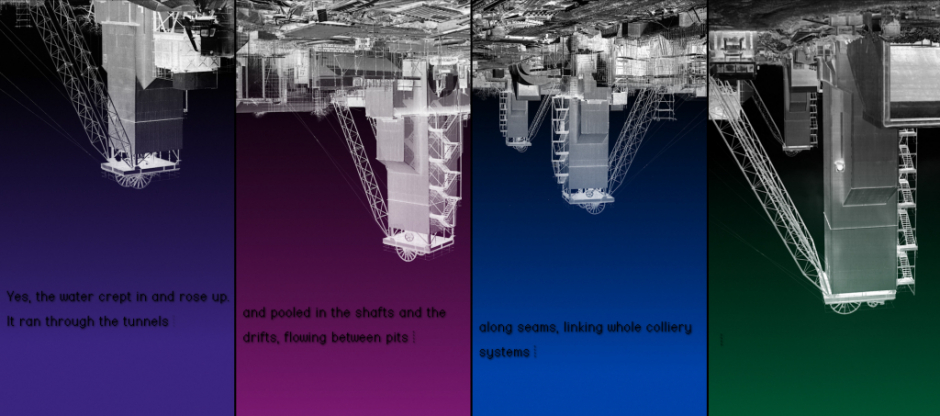Excerpt from Forgotten Work
Like all young bands, they bandied names about
All evening. Lou, the lead guitar, liked “Lout,”
A word that clubbed you like a cord of wood.
It’s dumb, said Lou, but arty dumb, like blood-
Smeared dolls deployed as drumsticks—Henry Rollins
Does Dada. Jim, on keys, preferred “The Dolphins,”
After the timeless ballad by Fred Neil.
Neil’s was the sort of myth that would appeal
To men like Jim. His lungs were honeycomb,
His low voice, ladled out. A man must roam
Was Neil’s recurring theme; he wrote a few
Great songs, swore off recording, then withdrew
To Xanadu (read: Florida). In exile
For several decades, Neil would not defile
His myth by adding even one more note
Of music to his oeuvre. Where a boat
Was docked he could be found, his profile prow-
Like, pointed at the sea.
“I think that’s how
Great artists—or great bands—should be,” said Jim,
As if inside an auditorium
And not his unnamed band’s rehearsal space.
“They should be hermits, right? They should efface
Themselves.” Because he led the group—composed
Its songs—Jim sometimes went full lecture mode.
“Like, take The La’s, who put out very little
Product,” said Jim. The La’s had dared to whittle
At one album for, like, years. The main
Songwriter couldn’t make the sound his brain
Contained. He ran through personnel, request-
Ed miracles: a “‘60s mixing desk.”
One was supplied, but then rebuffed. Its pixies
Had fled; the desk, he said, was missing ‘60s
Dust.
The record company relieved
Lee Mavers (connoisseur of dust; aggrieved
Auteur) of all the tape amassed to date,
And forced an album out that turned out great.
But Mavers, thwarted father, disavowed
His child. Much like Neil, he somehow wowed
The world against his will, then stopped recording.
Much like Neil’s, his genius was for hoarding.
Both lives proved a lesson: less is more
Than what most artists try to bargain for.
“And I am made more beautiful by losses,”
Added Jim. “That line is Howard Moss’s.
‘The Pruned Tree.’” (Jim liked quoting poetry.)
An editor, Moss knew that shears can free
A shape from shaggy chaos; that life requires
Edits; that first drafts should be filed in pyres;
That most of what we make—not just the rough
Work—should be aired in public, puff by puff,
By way of chimney. Artists need more patience.
They flood the market, drown their reputations.
“Of course,” said Jim, “we need a hit before
We vanish and become the stuff of lore.”
Silence. And then: “I’m just not sure,” said Lou,
“That I’m a dolphin.” Everyone laughed—Jim, too.
Jim’s space, a cramped garage they’d come to hate,
Was like a coop designed to incubate
An attitude: you have to learn to thrive
In limits. Jim had even had to hive
Off half the space; a wall of boxes, stacked
Like Marshall Amps, deterred (by literal fact
Of matter) arms inclined to windmill widely.
It boxed the singer in; he couldn’t idly
Wander off and roam the room the way
A star, unmoored from mic stand, starts to stray
From band, or buoys himself upon the surf
Of upturned palms, or strolls the stadium turf
To single out and serenade one fan
As frond-like arms brush by. Jim didn’t plan
To pen his band like veal, of course. (His boxes
Had nowhere else to go.) But paradoxes
Appealed to him. He liked the thought that jail
Produced a form of freedom; that a wail
Within a cell, hemmed in by razor wire,
Was a form of song.
The book Pale Fire
Was his favourite thing. If you behead
“This centaur-work” (“half poem, half prose,” as said
By Mary McCarthy) leaving for the vultures
The torso (prose) what’s left is Western culture’s
Most brilliant verse, by one John Shade. It dared
To rhyme and scheme. (Most men are now quite scared
To seem traditional or scan as staid.)
The author, though, was fake. Behind “John Shade”
Nabokov lurked like Oz. His book required
He fabricate a poet the world admired,
Which meant Nabokov had to ghostwrite first-
Rate verse. The lesson: art can be coerced.
To write about a brilliant poet, Nabokov
Was forced to be one. What a feat: to knock off,
Because your novel needs it, verse to order.
It’s almost like a painter needs a corner
To paint himself clean out of. It’s almost like
The most confining place to place a mic
Is where a restless man, weighed down with wings
To stretch, should force himself to stand and sing.
Perhaps the cramped garage just might inspire,
Jim thought. And then: “How ‘bout the name Pale Fire?”

